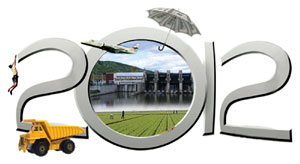 |
Our politicians are so busy with political backstabbing, they haven't had much time to think about stagnant economy. Even the PhD prime minister is too busy trying to juggle a potential mutiny within his party and handling the opposition.
Meanwhile, investment has gone down to zero and economic growth is not even keeping up with population growth. The Economic Survey 2010-11 showed that private sector investment declined to 14.2 per cent against GDP from 17.8 per cent in 2007-08. A recent World Investment Report has ranked Nepal eighth in ability to attract Foreign Direct Investment (FDI). Eighth from the bottom.
Nepal received only $39 million as FDI in 2010, whereas Nepalis working abroad sent home nearly $2 billion. But by declaring Nepal Investment Year, the economy will hopefully come back to centre stage in 2012. Of course, just calling it "investment year" will not open the FDI floodgates, a lot needs to be done to assuage potential investors.
Unstable politics, militant labour and a crippling power shortage, among other things, have been driving away the money. The biggest blow was the closure of Surya Nepal's garment factory in Biratnagar because of the relentless politicisation of labour.
The government is getting the laws in place. It has started amending a dozen industrial laws including the Foreign Investment and Technology Transfer Act, Industrial Enterprises Act, Company Act and Labour Act to ensure a hassle-free process for prospective investors. It also plans to introduce the Intellectual Property Act and new quality standards. Similarly, the Ministry of Industry plans to introduce an Industrial Enterprises Promotion Policy and is amending the existing Industrial Enterprises Promotion Act. A feasibility study of potential investment in agriculture, tourism, energy, infrastructure and medical and educational institutions will be carried out.
The build-up for Nepal Investment Year sounds encouraging, but the government has to walk the talk. Unlike tourism, Nepal is not a hotspot for investment. International tourist arrivals increased by over 20 per cent in Nepal Tourism Year 2011. We cannot expect the same for investment, there is a longer lag phase.
The proposed amendments in the Acts should not be left to collect dust, they should be discussed and ratified without delay. Investment incentives can be targeted to countries from where capital inflow has been high, such as India, China, the US and Japan. Investors in the NRN community should be wooed.
Domestic investors should not be ignored, and should also have a supportive environment. An integrated approach should be taken to deal with militant labour unions that have hindered businesses lately. Politics has no place in business. Last but not least, there must be coordination between ministries. Most investors are spooked by Nepal's formidable bureaucracy, a euphemism these days for shakedowns by officials.
The financial sector has recovered from its liquidity crisis, and is now attracting deposits. In the last five months, commercial banks alone have collected an additional Rs 56 billion, but only Rs 21 billion have been invested in this period. This bodes well for interest rate reduction for future investors.
We have been wise to announce a two-year long campaign for investment. If we can at least set the stage in 2012, then we can look forward to a more vibrant economic year in 2013. But, the politics first needs to settle down.
Read also:
Soaring confidence
Why Invest in Nepal Year 2012 ?
Investing in the future, SIDDHANT RAJ PANDEY
Foreign direct investment is essential next year and beyond to boost economy and create jobs



